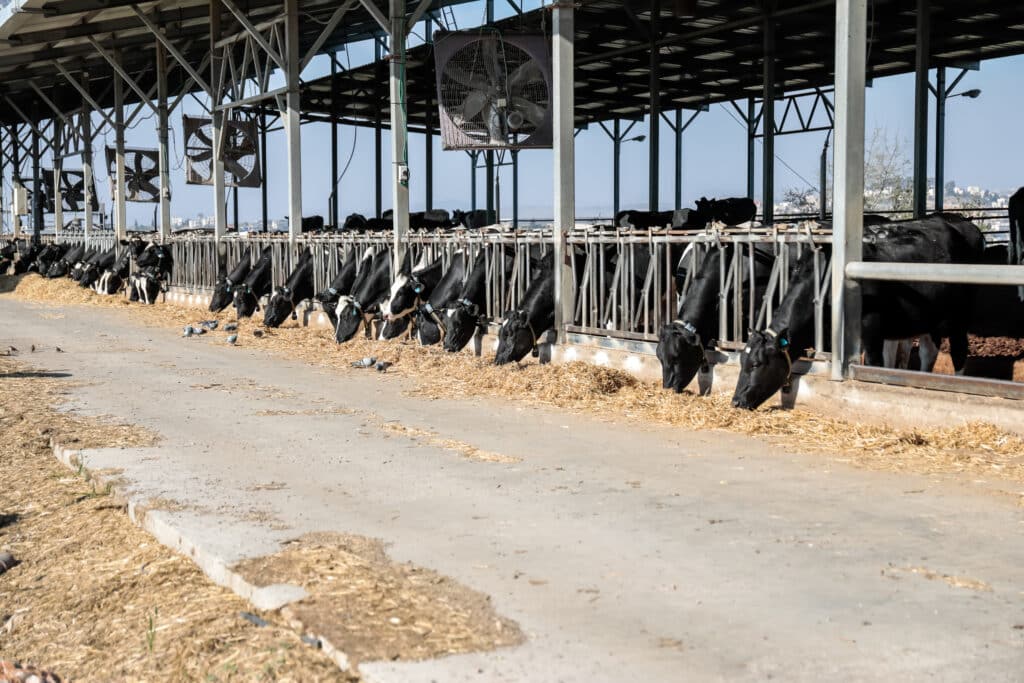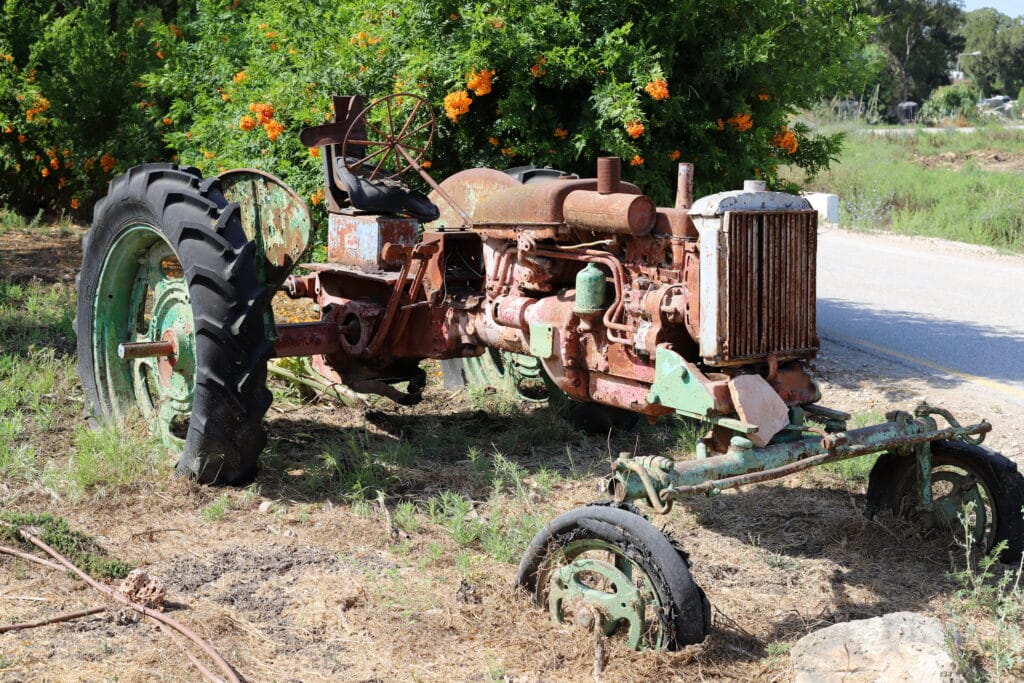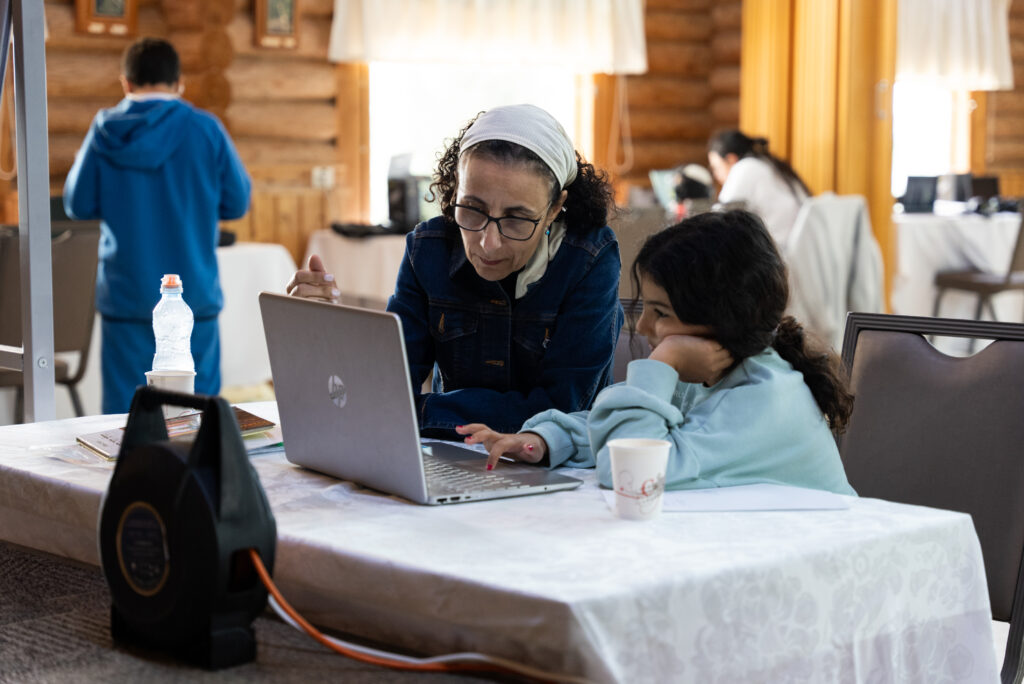A New Partnership of FIRM You Should Know About
Yad Hashmona, a moshav near Jerusalem, has been a longtime friend of FIRM. We have worked with the moshav in the past (e.g. hosting events), so for Yad Hashmona to become FIRM’s local partner was a natural next step.
But this process was expedited after the terrorist attacks on October 7.
The leaders of the moshav reached out to FIRM for help as soon as the war broke out. The community of believers agreed to welcome evacuees from danger zones without hesitation. Nevertheless, they needed a long-term plan on how to live together potentially for months, rather than just weeks.
“We didn’t have any funds for this operation,” said Ayelet Ronen, the Chairperson of the Moshav. Then a member of the Moshav’s Management Team suggested, “Why don’t we speak to FIRM?” But Ayelet thought, how do you even talk to someone about that?
And yet, the connection was quick. FIRM and Yad Hashmona share the same values, and we both have a heart for God’s kingdom and for people. The groundwork was already there, and there was no time to waste.
Have You Heard of Yad Hashmona?
As a new local partner of FIRM, Yad Hashmona is in many ways different from other FIRM partners. Our local partners tend to be congregations or ministries, meanwhile Yad Hashmona is a moshav. Which means, it is a communal village with its own management and objectives.
Yad Hashmona was founded by Finnish Christians who came to Israel in the 1960s. They arrived with a goal to volunteer at kibbutzim (pl. of kibbutz) in the land. These faithful supporters of Israel from Finland were mostly retired, and they wanted to help the returning Jewish people in their land.
One of the ways to do that was to become volunteers – and volunteering was experiencing its peak in Israel at the time. People from around the world would come to work in the fields, tend to cows and chickens, assist in any way needed.
After a while, a dream sprouted in their hearts to establish a kibbutz of their own. Everybody told them that they’re not Jewish, so they’ll never be able to do it. But they were persistent and full of faith.
Founding of Yad Hashmona
The leader of the Finnish group got to meet with Golda Meir, Israel’s prime minister in early 1970s. Consequently, the Christian volunteers received permission to start a moshav. It became official in 1971, and the moshav’s name (Yad Hashmona – Memorial of the Eight) was chosen to honor eight Jewish refugees from Austria who escaped to Finland in 1938.
(Sadly, most of them did not survive the war, because they were handed over to the Gestapo in 1942. The sole survivor of the extermination camps from the group, Georg Kollmann, later immigrated to Israel.)
Very soon after Yad Hashmona started its operations, the Yom Kippur war broke out (in 1973). Suddenly, people with no military experience and some even without knowledge of Hebrew or Arabic, had to become guards and watchmen of the village.
It took several years for the first Israelis to join the moshav. The initial mistrust turned to respect, then to admiration and connection. The founders knew that without locals they won’t be able to sustain the settlement.
What Exactly Is a Moshav?
Similar to a kibbutz, a moshav focuses on agriculturally tending the land. Members take communal responsibility for the village they live in. Today, many moshavs (or moshavim – pl. in Hebrew) run businesses together that can involve agriculture, tourism, or industries of many kinds.
In contrast with the traditional kibbutz, moshavim retained the family as the center of social life. At kibbutzim, childrearing was often communal as well. Meals were shared at the public canteen (rather than in individual homes), and after a certain age, children stayed in dormitories rather than their parents’ homes.
However, the communally radical kibbutz is now a thing of the past. So today, there are very few differences between a life on a kibbutz and on a moshav.
At Yad Hashmona, the village members participate in committees and in the general assembly to make decisions. These can pertain to the use of the land, management of business, celebrating holidays, and developing the infrastructure.
Yad Hashmona Today
The moshav serves as an important platform for activities in the believing community of Israel. It hosts conferences, holiday gatherings, seminars, congregational gatherings, events, youth and children’s activities, and more. It is even a home to several small businesses and organizations.
Yad Hashmona offers them a safe and sacred space to operate and carry out their visions for impacting and being a light to the wider Israeli community.
Today, the community of Yad Hashmona represents a new generation – different from that of her founders. Unlike in the beginning, most of the residents did not come from abroad, but are part of the local body of believers.
Entire new neighborhoods were built to accommodate for young families who wanted to join the moshav.
But Yad Hashmona also receives thousands of Israeli visitors annually who don’t yet know Jesus. Some want to visit the Biblical Gardens, while others simply come to admire the spectacular views of Judean Hills from the moshav.
Biblical Archeological Garden
The northern hillside of the moshav is especially interesting to locals and visitors alike, because of a unique attraction. With the cooperation of the Beit Shalom Association in Switzerland and the Israeli Antiquity Department, a biblical village was constructed in year 2000.
The Biblical Archaeological Garden includes ancient wine and olives presses, a vineyard, a Bedouin tent, a replica of an ancient synagogue, and more. It was constructed with the vision and purpose of giving visitors a glimpse into the spiritual, physical, and agricultural world of the Jewish people in the land of the Bible.
The village offers a wonderful opportunity to grow in a deeper understanding of the Biblical text in a conveniently sized, and beautifully landscaped location.
The secular Israelis who visit the Garden usually don’t know any Messianic congregations or ministries. They might not even know any believers in Yeshua personally. Here, they see a village. But they are curious and usually ask many questions.
Hospitality on a Hill
In the believing circles, Yad Hashmona is probably most known for the Logos Hotel. Here, the moshav hosts weddings, Bar and Bat Mitzvahs, holiday celebrations, conferences and more.
The hotel premises, designed in a unique Finnish Scandinavian style, include wooden loges that are not very common in Israel. But they match the landscapes and forested mountains of the Judeans Hills beautifully.
The hotel often hosts Christian groups from around the world as well, and even regular Israeli tourists. There is room for everyone. And then, every Shabbat the Yad Hashmona, a local congregation meets at the Biblical Garden for Worship, prayer, and Bible study.
Yad Hashmona and the Messianic Movement
Recently, Yad Hashmona had a vision to establish a pioneering archive for Messianic Jewish historical documents. The vision is to collect and preserve materials of interest relating to the history of the modern Jewish believers in Yeshua in the Land of Israel.
There are many myths surrounding the modern Messianic Jewish movement. As Zionism spread among Jews worldwide, so did the recognition of Yeshua as Israel’s Messiah, the Savior and Son of God. The past century is filled with stories that the local body believes should be well documented. And Yad Hashmona proved to be just the right place to store them, too.
The archival materials consist of documents, photographs, audio and video recordings, graphical symbols, logos, seals, and much more. This unique archive continues to grow, thus it is also in need of a proper infrastructure, to preserve these materials.
Yad Hashmona Operations in Time of Crisis
For over 50 years Yad Hashmona has been a village with strong community ties, but not only internally. The moshav is known for its hospitality, offering activities for children and youth, support for the elderly, and also for hosting events.
Their vision is to expand this village and extend its residential capacity up to 300 families.
This vision was painfully tested last fall, after the horrendous terrorist attack on October 7 and the subsequent outbreak of war. As mentioned in the beginning, Yad Hashmona spontaneously opened its gates to dozens of families fleeing the warfront.
That dreadful day, at 6:30 in the morning the residents heard sirens, warning them of a rocket attack. But it didn’t end there. It became very clear very fast that something serious was going on.
That same day, the young people at the moshav began receiving phone calls from their IDF units, to show up for service. By Sunday morning, about 40% of the young men from the moshav were gone to serve and protect the nation they love.
Meanwhile at Yad Hashmona, with not too many men left and maybe just two pistols in the whole village, the leaders had to develop a strategy how to protect its residents. The risk of the situation escalating was high, as it was reported that many terrorists were still at large.
Guardians of the Moshav – Yad Hashmona’s Emergency Squad
Those who weren’t called up for reserve duty quickly organized an emergency squad in the moshav. They stationed people at the gates, and organized patrols all around the village.
Together with other villages in the Judean Hills, they approached the county for support in providing “long weapons” and essential training. In the weeks that followed, the Israeli Border Police played a crucial role by providing training and demonstrating what to do in case of danger.
The residents of Yad Hashmona took proactive steps to keep the village safe. The patrols in the village maintain to this day a visible presence. It not only safeguards the community but also significantly increases the overall sense of security.
But even before this emergency squad was formed, Yad Hashmona was challenged to protect more than just its residents. Already on Sunday – the day after the initial attack – many at the moshav started receiving phone calls from people who needed shelter.
Left to Their Own Devices
Initially, it was other believers from southern Israel, pastors who were calling on behalf of their communities in danger zones. Naturally, everyone’s first reaction was, “yes, come! We’ll take care of you!” But within hours, the moshav was at its capacity.
The families that arrived at Yad Hashmona were not just the believers who called – it was also their neighbors, and the neighbors’ friends… the news of a haven in the Judean mountains spread quickly, but their resources were limited.
Also, many came without any belongings or resources. They didn’t have time to pack, nor did they know for how long they were going. Since no one knew when the government would be able to help, Yad Hashmona residents started a rally to gather supplies.
Messages began circulating: “we need long pants”, “does anyone have jackets for kids”, “who has shoes size XYZ…” Out of nowhere, toys and books and clothing began to pile up.
Israelis are very generous and like to be of service, especially in times of crisis. People from the whole region dropped off bags with clothes and daily supplies. Meanwhile, the youth of Yad Hashmona mobilized to sort the gifts and make them accessible to their guests.
“I think when we’re busy – we’re good. So this thing kept us going,” Ayelet reflected.
New Communal Life Since Outbreak of War
Yad Hashmona organized various activities for the children and youth during these challenging times. The youngest ones has been deeply affected by the conflict in Gaza. They often engage in imaginative play, running around with improvised weapons and vests, expressing a desire to protect the community from the enemy they can’t see.
To channel their enthusiasm positively, some have taken on the responsibility of providing them with lessons in IDF training. The children and youth were thrilled to learn about navigation, map reading, physical training, and more. Their commitment is evident, and it’s heartening to see how much they want to protect Yad Hashmona.
This growth in their love for the country and understanding of the work of God in this Land is truly encouraging. But residents of the moshav realized that they also needed to shield their children from the harsh realities of the war.
Children absorb information from parental conversations, media, and the constant hum of daily news. The impact on these young minds is undeniably formative. The Yad Hashmona community strives to guide them through their fears and imagination with thoughtful responses.
What’s Next?
Most evacuees sheltered at Yad Hashmona and at other places feel like refugees. Some have nowhere to go because their homes were destroyed by rockets or fire. But they miss their community and their routines, so they are determined to “go back” – however it may look like.
While the government is still trying to resolve all the housing issues, FIRM and our local partners are taking care of these families for as long as needed. A lot of the children continue their education (some remotely), while the parents seek ways to work from home.
Nevertheless, every displaced person seems to share the same dream right now: to return home. Many, who arrived at Yad Hashmona in October, have returned to their towns. But dozen of new families arrived in their place – having relocated from hotels and other temporary solutions.
Helping displaced Israelis return home has been a great testimony to many. We want to make sure that as they courageously attempt to rebuild their lives, they know they are not alone and have what they need.
Do you want to join the efforts of helping displaced Israelis return home?
Articles Related to Displaced Families at Yad HaShmona: Help Them Return Home
Estimated reading time: 11 minutes




